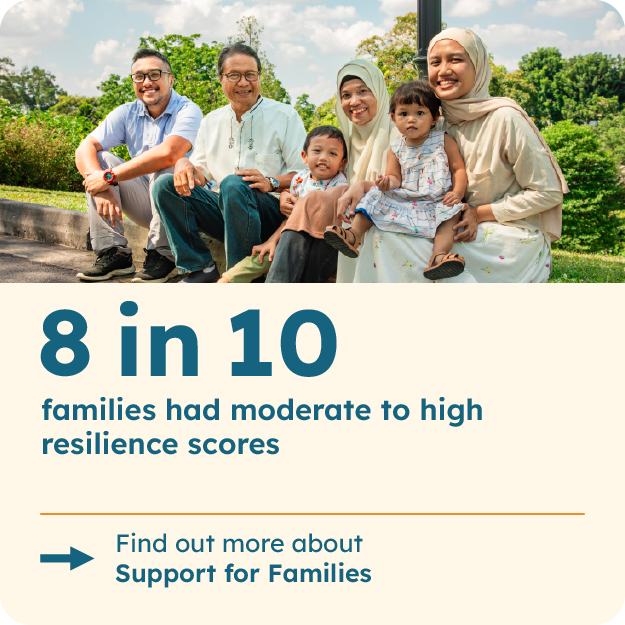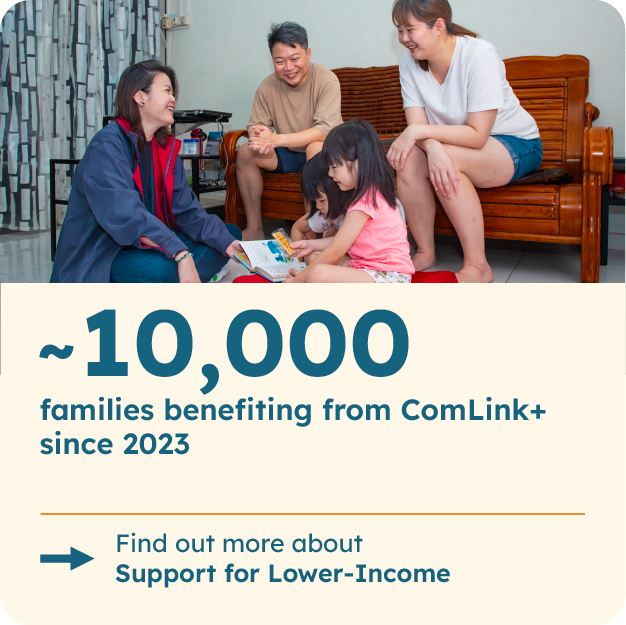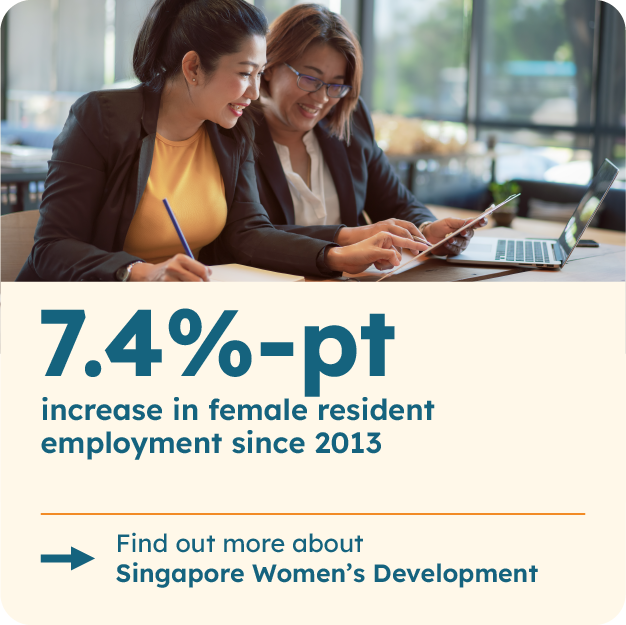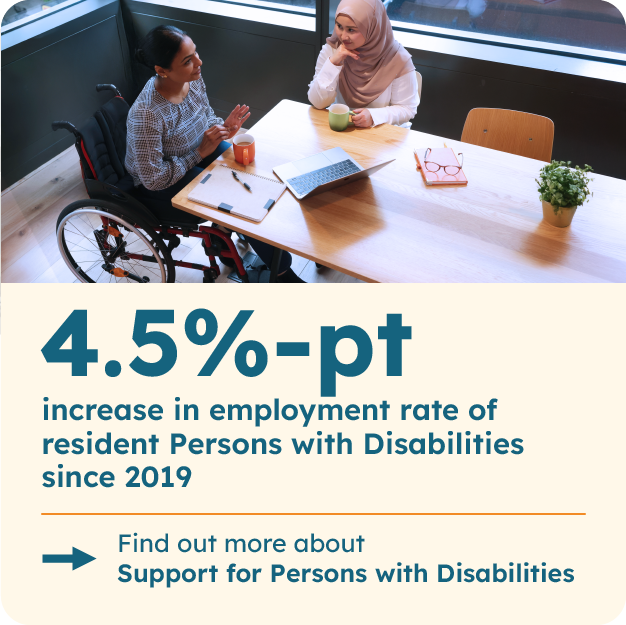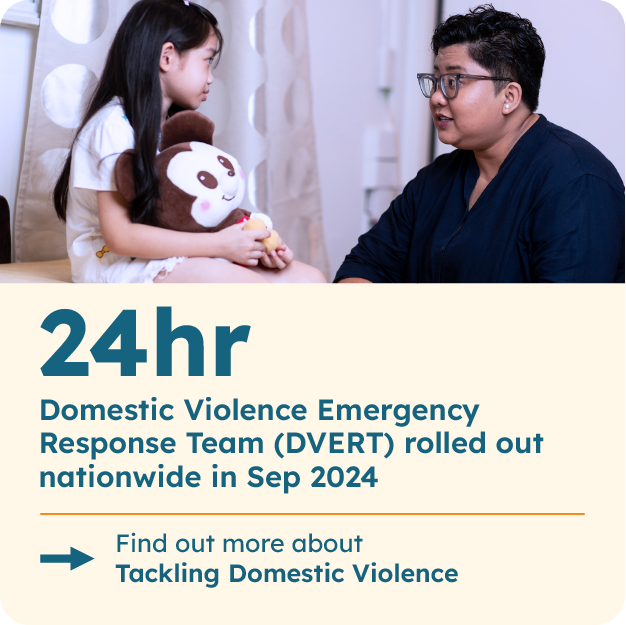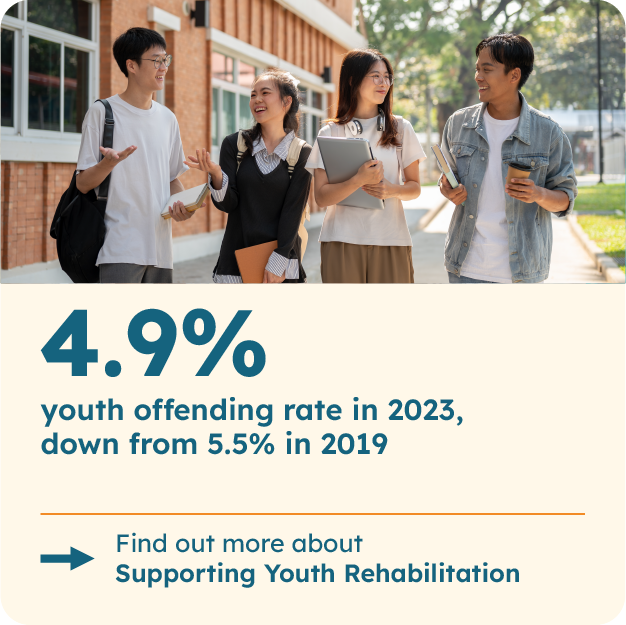Building Families Together
Over the Years: Uplifting Families Together
2024: | 2023: | 2022: |

We strive to make Singapore a place where families can grow and thrive through every season of life. Nurturing a family-friendly nation is an all-hands effort involving the Government, community partners, businesses and individuals. The “A Singapore Made for Families 2025” plan reflects our whole-of-society commitment to a family-friendly society.
Efforts to support families include:
1) Families for Life Movement
- Marriage programmes and faith-based marriage preparation and enrichment programmes, e.g.:
- Prevention and Relationship Education Programme (PREP);
- Cinta Abadi ('Eternal Love') marriage preparation programme for Muslim couples;
- Journey with You (JoY) marriage mentoring for newly-wed or soon-to-wed couples;
- Our Marriage Journey Quiz (OMJQ) for couples to understand strength and growth areas, with tips to improve their relationship
- Parenting and grandparenting programmes to deepen parenting/grandparenting skills, e.g.:
- Triple P for parents/grandparents with children 0-16 years old
- Purposeful Play for parents with children 0-6 years old
- Partnerships to bring parenting and marriage resources closer to families, and strengthen family bonds, including integrated social-health support through Family Nexus, marriage and parenting talks at pre-schools, schools and workplaces, and town-level family events
- Campaigns celebrating lasting marriage, families and strong intergenerational bonds, e.g. I Still Do, National Family Festival and Celebrating our Grands
- More details here
2) Government-Paid Leave Schemes
- Up to 16 weeks of Government-Paid Maternity Leave for eligible working mothers to care for newborns
- From 1 April 2025: 4 weeks of mandatory Government-Paid Paternity Leave for fathers
- From 1 April 2025: New Shared Parental Leave allows parents to share an additional 6 weeks of parental leave. This will be further increased to 10 weeks from 1 April 2026
- More details here
3) Access to affordable and quality preschools
- Around 2025, 80% of preschoolers can have a place in Government-supported preschools
- In 2025, fee caps for full-day childcare in Government-supported preschools will be lowered to $640 (Anchor Operator) and $680 (Partner Operator) per month
- In 2026, a final reduction will be made so that dual-income families with children enrolled in Anchor Operators will pay similar to primary school fees with after-school student care, before means-tested subsidies
- More details here
4) Family Service Centres (FSCs)
- Community-based social services to support lower-income and vulnerable individuals and families with social and emotional issues
- Locate your nearest FSC here
Find out how we have increased support for families through the Family Trends Report.

We support lower-income households in their journey to achieve stability, self-reliance, and social mobility. Our approach has evolved over the years, moving beyond providing social assistance to social empowerment. The Government and community walks alongside families to supplement their effort towards their longer-term aspirations.
Here are some schemes to help lower-income families:
1) Comlink+
- Dedicated family coaches work with lower-income families with children to co-develop action plans and coach and motivate them towards achieving their goals. They also coordinate support across multiple programmes to help families better navigate social support services
- ComLink+ Progress Packages provide additional financial support when families take active steps in the areas of preschool education, employment, home ownership and debt clearance
- More details here
2) Support for Early Childhood Development
- KidSTART supports parents to become confident and competent caregivers. Efforts begin antenatally at the hospital to support pregnant mothers. Families receive more support through home visits when the child is born and grows older
- In the preschool setting, various support measures ensure children from lower-income families can access affordable preschool education. This includes preschool subsidies, priority enrolment into Anchor Operator (AOP) preschools and MOE Kindergartens. Selected AOPs receive additional funding to provide attendance and learning support to these children
3) ComCare
- Financial assistance to support lower-income individuals and families with their basic living expenses
- More details here

In 2022, the Government published the White Paper on Singapore Women's Development, which reflects our shared vision for a Singapore where men and women partner each other as equals and both pursue their aspirations freely and fully.
Here are some key progress indicators:
1) Strong International Ranking
- Singapore was ranked 8th globally and 1st in Asia Pacific for gender equality in the United Nations Gender Inequality Index published in 2024
2) Economic Empowerment
- STEM Careers: From 2013 to 2023, the percentage of women in science, technology, engineering and mathematics (STEM) jobs has grown from 29% to 34%
- PMET Roles: In 2023, nearly 47% of professional, managerial, executive and technician (PMET) roles were held by women, up from 42% in 2013
- Women in Leadership: Through the efforts of the Council for Board Diversity (CBD), the percentage of women on the boards of the top 100 companies listed on the Singapore Exchange (SGX) has reached 25.3%, which is more than a three-fold increase from 7.5% in 2013. For statutory boards and the top 100 Institutions of a Public Character (IPCs), the percentage was at 34.2% and 31.5% respectively. (Figures are as at end-June 2024)
3) Support for Caregivers
- Childcare: From 2022 to 2023, over 10,000 full-day preschool places were added. Another 40,000 full-day places will be developed by Anchor Operators from 2025 to 2029. 6,000 of these places will be for infant care
- In 2023, there are more than 200,000 full-day preschool spots, sufficient for every resident child aged 3 and above
- Government-Paid Paternity Leave: Since its introduction in 2013, take-up rate has risen from 47% in 2016 to 53% in 2021
- Financial Aid: The Home Caregiving Grant was increased. Eligible families can receive up to $400 per month, double the previous amount of $200
Learn about our achievements and future plans through the Progress on Singapore Women’s Development 2024 Report.

We want Singapore to be a place where persons with disabilities (PwDs) are enabled to pursue their aspirations, achieve their potential, and participate as integral members of society. The Enabling Masterplan 2030 (EMP2030) sets out this vision for Singapore and guides our efforts to create a truly inclusive nation by 2030. It was developed by, for, and with persons with disabilities, their caregivers and families.
Here are the three key areas of support:
1) Support for Lifelong Learning
- Added 1,500 places to the Early Intervention Programme for Infants and Children (EIPIC) and EIPIC-P in 2024
- Lowered fees in nine SPED schools by up to 60%: By July 2025, about 3,500 Singaporeans in these schools will pay monthly fees between $60 - $90, down from $72 - $150
- Launched Enabling Skills and Competencies Framework. Find out more about SG Enable’s Enabling Academy here
2) Support for Independent Living
- First Enabling Services Hub (ESH) launched in 2023 to make neighbourhoods more inclusive through outreach services and collaborations with community partners. Two more ESHs to be launched in Jurong West and Punggol. Find out more about ESH here
- First Enabling Business Hub (EBH) launched in 2023 to bring jobs closer to where PwDs live and encourage inclusive hiring practices. Find out more about EBH here
- Estimated 4,500 PwDs to be employed by 2030 by expanding employment opportunities, growing and developing capabilities of inclusive employers and job coaches, to contribute to the EMP2030 target of 40% PwD employment rate by 2030
- Increasing 500 Day Activity Centre and Sheltered Workshop spaces by 2030
- Upcoming pilot Enabled Living Programme to expand community living options
3) Creating Inclusive Environments
- Increased Enabling Transport Subsidy to reduce out-of-pocket transport fees
- As at July 2024, about 80% of buildings and almost all our public spaces are accessible to PwDs
- Cultural institutions and sports facilities are more accessible, with inclusive programming and events
Learn more about the Enabling Masterplan 2030.

Domestic Violence is not easy to detect as it often happens behind closed doors. The Government works closely with community partners to strengthen support for survivors and enhance rehabilitation of perpetrators of domestic violence. All of us have a collective responsibility to keep survivors safe and empower both survivors and perpetrators of domestic violence to come forward to seek help.
Here are key channels and efforts to report, detect and address domestic violence:
1) National-Anti Violence and Sexual Harassment Helpline (NAVH)
- Dedicated 24-hour helpline for reporting of violence or abuse, including sexual violence and sexual harassment.
- NAVH operates primarily in English, with Mandarin, Malay and Tamil options available.
- More details here.
2) Domestic Violence Awareness Training
- To equip those in the people, public and private sectors with knowledge on the types of abuse and neglect, ways to detect violence and how to respond.
- More details here.
3) 24-hour Domestic Violence Emergency Response Team (DVERT)
- DVERT team works closely with the police for high-risk domestic violence cases with immediate safety concerns to the survivor.
Read about domestic violence trends here.

We are committed to supporting youth offenders in their rehabilitation journey and reintegrating them into society. Successful rehabilitation and reintegration of youth offenders require a whole-of-society effort, where Government works closely with community partners and families of youth offenders.
There are various rehabilitation programmes designed to address the specific risks and needs of youth offenders:
1) Diversionary Programmes
- Three diversionary programmes - Guidance Programme, (Enhanced) Streetwise Programme, and Youth Enhanced Supervision Scheme
- Run by Integrated Service Providers, which are social service agencies appointed by MSF
2) Probation Orders
- Overseen by MSF's Probation and Community Rehabilitation Service and aims to rehabilitate youth offenders within the community, allowing them to continue their education or employment.
3) MSF Youth Home Orders
- MSF Youth Homes (i.e. the Singapore Boys' Home and Singapore Girls' Home) provide academic, rehabilitative, and holistic development programmes to address the youths' re-offending risks and rehabilitation needs.
Read about trends in supporting youth rehabilitation here.
